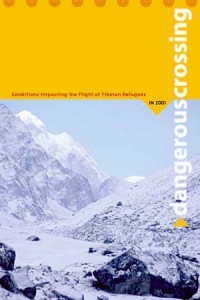 In a new report called “Dangerous Crossing, Conditions Impacting the Flight of Tibetan Refugees in 2001,” the International Campaign for Tibet examines the political circumstances in Nepal that are jeopardizing the traditional hospitality extended to Tibetan refugees on the flight to exile.
In a new report called “Dangerous Crossing, Conditions Impacting the Flight of Tibetan Refugees in 2001,” the International Campaign for Tibet examines the political circumstances in Nepal that are jeopardizing the traditional hospitality extended to Tibetan refugees on the flight to exile.
“Dangerous Crossing” focuses on changing political conditions in Nepal that put at risk the traditional tolerance towards Tibetan refugees and the informal agreement between the Nepal government and the U.N. High Commissioner for Refugees (UNHCR) that provides for their safe transit to India.
The report considers the reasons why Tibetans undertake the dangerous journey into exile and examines the logistical challenges of this journey, the obstacles along the way, and the mechanisms in place to assist them in transit.
“Dangerous Crossing” was compiled in ICT’s Washington, D.C., and Amsterdam offices, as well as from within Tibet and the Tibetan refugee communities in India and Nepal.
Since the 1980’s, ICT has interviewed hundreds of Tibetan refugees both en route in Nepal and newly arrived in India. Their accounts have been an important source of information on human rights, the economic and political situation in Tibet and, as this year’s report indicates, the strategies China has adopted to muffle the spread of such information.
In particular, the report examines the effects of China’s growing influence in Nepal and concludes with recommendations to interested governments and NGOs, and to the UNHCR.
Even since this report when to print, there has been an alarming deterioration in Nepal’s level hospitality towards Tibetans, which appears directly linked to strengthening relations between Beijing and Nepal’s new government.
This summer, Nepal has demonstrated strong opposition to any significant gathering of its Tibetan residents. The government now officially views any such gatherings as “activities that undermine China’s interests.”
On July 6, Nepal’s Home Ministry ordered the Radisson Hotel in Kathmandu to shut down a celebration in honor of Dalai Lama’s 67th birthday and “not to accept any orders for receptions or entertainment from any Tibetan refugee groups.”
Six days later, following a meeting with Nepal’s King Gyanendra, Chinese President Jiang Zemin was quoted in the press as saying, “We sincerely thank Nepal for its longstanding support on issues like Tibet, Taiwan and human rights.”
On July 25, Nepalese police halted a press conference organized by Tibetans who wished to defend charges against the Dalai Lama by a religious group that is believed to receive backing from the China and fosters disunity among Nepal’s Tibetan communities.
Two Tibetans involved in organizing the press conference were arrested and interrogated before being released. The Nepal Foreign Ministry used the occasion to make clear that “Nepal has a one-China policy.”
These actions are particularly disturbing as they are aimed against Tibetans legally residing in Nepal or Tibetans with Nepalese citizenship who support the Dalai Lama.
The situation is compounded by a restrictive climate for Tibetan refugees who are seeking safe transit through Nepal, a process supported through the United Nations High Commissioner for Refugees (UNHCR) in Kathmandu with significant U.S. funding and diplomatic attention.
Despite the fact that Nepal is queued up to receive substantial U.S. assistance to combat its rebel Maoist insurgency, the Nepalese government is aligning itself more and more transparently with Chinese interests in suppressing the human rights of the Tibetan people.
You can find this report as a PDF document here »

